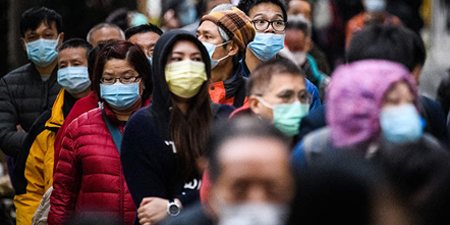CPJ issues safety advisory for covering coronavirus
JournalismPakistan.com | Published: 11 February 2020
Join our WhatsApp channel
The Committee to Protect Journalists (CPJ) has released a safety advisory for journalists covering the coronavirus outbreak. It outlines vital precautions and travel recommendations to ensure reporter safety amidst the ongoing pandemic.Summary
Since the first cases of the novel coronavirus (2019-nCoV) were recorded in Wuhan, China, in December 2019, the infection has quickly spread to all of mainland China and to at least 27 other countries and territories around the world, according to news reports and the U.S. Centers for Disease Control and Prevention. The World Health Organization (WHO) declared the outbreak a Public Health Emergency of International Concern on January 31, 2020. A WHO map showing the global distribution of cases can be seen here.
As new information emerges, updated health advice and outbreak news will be issued by the relevant authorities. To keep up-to-date, journalists covering the outbreak should monitor the WHO, the CDC and Public Health England (PHE).
Journalists who are planning to cover the coronavirus outbreak should consider the following safety information:
Pre-Assignment
- Before travelling to an affected country, ensure all relevant vaccinations and disease prophylaxis are up-to-date for your destination. For more information, see: Fit For Travel​
- Do not travel if you are sick. Many international and regional airports, as well as other transportation hubs like train stations, have implemented health screening measures. Travelers may face testing and enforced quarantine
- Be aware of misinformation, something that the WHO has specifically warned about
- Research the latest security situation. There have been further protests in Hong Kong regarding the coronavirus outbreak and the response of the authorities, as well as a related strike by health professionals
- Family members may be concerned and stressed about such assignments. Have a discussion with them about the risks and their concerns. If necessary, set up conversations between family members and your organization’s medical advisers. Be aware that some organizations and employers have increased their evacuation preparedness level for any personnel based in affected countries
Travel Planning
- Travel options have significantly decreased in recent weeks due to major airlines cancelling flights to/from mainland China. Such airlines include British Airways, Air France, American Airlines, Thai Airways, Ethiopian Airlines, Qantas, Qatar Airways, Lufthansa group (Austrian Air, Swiss Air and Lufthansa), and Delta Airways. Others, such as Emirates and South African Airways, have either cancelled or reduced flights to Hong Kong.
- Check your travel insurance policy. Some governments have issued varying levels of travel advice and alerts against heading to China. This includes the British Foreign and Commonwealth Office, the U.S. State Department, and the French Affaires Etrangeres
- Check on the latest visa situation for your destination. Be aware that numerous countries have stopped issuing visas on arrival to Chinese nationals, and/or visas to people who have recently been to Hubei province. Such countries include Bangladesh, Singapore, Malaysia, Indonesia, Brunei, and India
- Be aware that travel bans or enforced quarantine on arrival has been imposed on travelers from China by various countries, including Australia, Japan, New Zealand, India, the U.S., Saudi Arabia, Israel, and the Philippines
- Maintain flexible itineraries and allow additional time at airports around the world, particularly in the Far East, taking into account health screening measures and temperature checkpoints. The same applies at railway stations, ports/docks, and long-haul bus stations in the region
- Be aware that some land borders with China have been closed, including Russia and Mongolia. Other countries have closed certain border crossings
- If visiting China, research and monitor the latest inner-city movement restrictions within the country via local sources
Avoiding Infection
Standard recommendations to avoid infection include:
- Avoid close contact with anybody showing symptoms of respiratory illness, such as coughing and sneezing. Always place your hand over your mouth and nose when coughing and sneezing
- Wash your hands regularly with hot water and soap. Use anti-bacterial gel or wipes if hot water and soap is not available, but always follow this up with a hot water and soap wash as soon as possible
- Use protective gloves if working in or visiting an infected site such as a medical treatment facility. Other medical personal protective equipment (PPE) such as a bodysuit and full face mask may also be necessary
- Only consume cooked meat and eggs
- Do not visit wet markets or farms in an affected area. Avoid direct contact with animals (live or dead) and their environment. Do not touch surfaces that may be contaminated with animal droppings
- If you are operating in a market/farm, never place your equipment on the floor. Always decontaminate equipment with fast acting antimicrobial wipes such as Meliseptol, followed by thorough disinfection
- If working in an affected market, use disposable footwear or use waterproof overshoes, both of which must be wiped/rinsed off as soon as you exit the location. If using waterproof overshoes, they should be disposed of before leaving the scene. Always follow local guidance
- Avoid proximity to and/or entering an animal pen, or the cage of large/unpredictable animals. In the event that you are bitten by an animal seek medical advice as soon as possible
- Never eat or drink while touching animals, or in the proximity of a market or farm
- Always ensure your hands are washed thoroughly with hot water and soap before, during and after leaving an affected area
- If you develop symptoms, especially fever or shortness of breath, consider how you will seek medical treatment. Some government health bodies may recommend self-quarantine to prevent the infection of others. If you are in the Far East, you may risk encountering coronavirus-infected patients at crowded treatment centers, therefore increasing your chances of exposure
- Always follow the local health authorities’ guidance and instructions
Face Masks
The CDC and WHO are in agreement that it is not necessary for people without symptoms to wear masks, unless you are told to by the local authorities; you are in a high-risk area such as a hospital; or you are taking care of a person with suspected novel coronavirus infection. If you do wear a mask you should follow this advice:
- If necessary, an N95 mask is recommended over a standard “surgical” mask
- Ensure that the mask fits securely over the bridge of the nose and chin, minimizing gaps in the fit
- Avoid touching the mask, and only remove it by using the straps. Never touch the front
- Always wash hands with soap and hot water, or with an alcohol-based hand sanitizer (minimum 60 percent alcohol) after removing the mask
- Replace the mask with a new, clean, dry mask as soon as it becomes damp/humid
- Never reuse masks, and always dispose of used masks immediately into a sealed bag
- Remember that use of a mask is only one part of personal protection. Not touching your mouth, nose, and eyes and regularly washing your hands are strongly recommended. Cotton/gauze masks are not recommended under any circumstances
- Be aware that face masks may be in short supply and/or subject to sharp price increases, depending on the location
Post-Assignment
- Monitor your personal health after leaving an affected area, such as markets/farms, and if you have visited an affected country. Seek medical attention if you develop respiratory symptoms within 14 days of return, informing the health service prior to attendance about the recent travel/ risk of exposure
- Inform your employer and management team if you develop respiratory symptoms
- Monitor the latest information on the virus, as well as any quarantine and isolation procedures being implemented at both your origin and your destination
CPJ’s online Safety Kit provides journalists and newsrooms with basic safety information on physical, digital, and psychological safety resources and tools, including on covering civil unrest and elections. —By CPJ/Photo: AFP
KEY POINTS:
- Journalists should ensure vaccinations are up-to-date before traveling to affected areas.
- It's essential to avoid misinformation and monitor health organizations for updates.
- Travel options have decreased, and many countries have imposed travel bans or restrictions.
- Standard infection control practices should be followed, including frequent handwashing.
- Journalists must remain vigilant about their health after returning from affected regions.

























